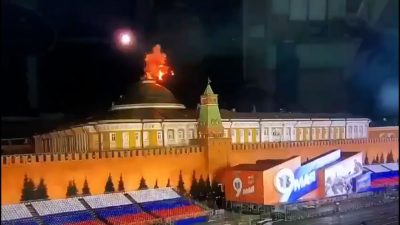Drone Attack on Kremlin May Further Escalate Conflict with Ukraine

All Global Research articles can be read in 51 languages by activating the Translate Website button below the author’s name.
To receive Global Research’s Daily Newsletter (selected articles), click here.
Click the share button above to email/forward this article to your friends and colleagues. Follow us on Instagram and Twitter and subscribe to our Telegram Channel. Feel free to repost and share widely Global Research articles.
***
On the night of May 2, there were two unsuccessful drone strikes against Kremlin and Senate facilities in the Russian capital. The purpose of the operation was allegedly to assassinate Russian President Vladimir Putin. The reaction to the case has been serious, with members of the Russian parliament demanding that tough measures be taken to respond to the provocation on the battlefield.
The attacks were made with unmanned aerial vehicles (UAVs), but Russian defense forces managed to disable the equipment using electronic warfare techniques. Several videos, some of which unverified, circulate on the internet showing the moment when the UAVs were neutralized near Russian state facilities.
There were no reports of damage caused by the attack, as the quick action of the Russian security forces was efficient in preventing the success of the terrorist operation. It is believed that the main objective would be to reach the residence of the President of the Russian Federation, assassinating him which anyway would not be possible since at that moment Vladimir Putin was not in the place.
The Russian government blamed the Kiev regime for the attacks, which was promptly rejected by the Ukrainian authorities. Without showing any evidence, spokespersons for the neo-Nazi regime accused Moscow of having carried out a false flag attack whose aim would be to legitimize escalations of violence on the frontlines. As expected, some western media outlets have adopted this narrative, accusing Moscow in an unsubstantiated way. However, a deeper analysis of the case shows that this interpretation seems absolutely wrong.
The attack on the Kremlin was not a one-off event, but part of a larger wave of Ukrainian air raids into Russia’s pacified or undisputed sovereign space. In recent days, the regime reportedly attacked, in addition to the Russian capital, the regions of Bryansk and Krasnodar, having hit oil facilities in the latter, which caused fires in the city. As well known, for months Kiev has been launching sequential irresponsible incursions against Russia in what appears to be a desperate attempt to provoke violent Russian responses, thus justifying that NATO sends more weapons.
In this sense, it seems illogical to claim that Moscow would be interested in performing a false flag operation against its own capital to justify escalations, when it is the Western-Ukrainian side that shows interest in escalating. If it were in Russia’s interest to increase the intensity of its attacks on Ukraine, there would be already enough reason to do so, as Kiev has carried out several provocations in recent months.
The main problem, however, is that Russian patience may be running out. After the attack on Moscow, many Russian officials reacted by demanding quick, strong and incisive actions to retaliate. There is strong pressure for orders to be given to the Russian armed forces to destroy the entire enemy firepower as quickly as possible. Some politicians even suggest that direct actions against Ukrainian officials should be taken.
The day after the Kremlin incident, heavy Russian attacks took place across Ukraine, mainly in Zaporozhye, Odessa and Kiev. The intensity of the attacks is expected to increase even more in the coming days. Some advisers are urging Zelensky, currently visiting Europe, to stay out of Ukrainian territory indefinitely. In the same vein, the American Embassy in Kiev asked American citizens to leave the country as soon as possible.
The Ukrainian side believes that with the intense Russian attacks, it will have greater arguments to ask the West for help with new military packages. However, this calculation may be wrong. If Moscow maintains a high intensity of attacks, the tendency is that Kiev may be neutralized even before the new Western weapons are eventually used on the battlefield. Russia has been using only a small portion of its military power in the special operation, while Ukraine is fighting with everything it has. Even if it receives more sophisticated weapons from the West, Kiev certainly will not have any chance of maintaining the conflict for long time if the Russians decide to increase their combat mobilization.
Indeed, Moscow has its right of retaliation in the face of such a provocation, but the situation is much more serious than that. There are arguments for the Ukrainian State itself to be considered a terrorist organization, against which Russian forces would be authorized to use all available means of combat. This would lead to a formal change in the nature of the special military operation, pushing the conflict to new levels. In this hypothetical scenario, NATO should be considered an organization sponsor of terrorism for insisting on arming Kiev despite the crimes committed by the regime.
There is still not enough information to know whether this step will be taken, but it is one of the possibilities given the current scenario. What is known, however, is that some serious retaliation is certainly on the way.
*
Note to readers: Please click the share button above. Follow us on Instagram and Twitter and subscribe to our Telegram Channel. Feel free to repost and share widely Global Research articles.
Lucas Leiroz is a journalist, researcher at the Center for Geostrategic Studies, geopolitical consultant. You can follow Lucas on Twitter and Telegram.
Featured image is from InfoBrics

